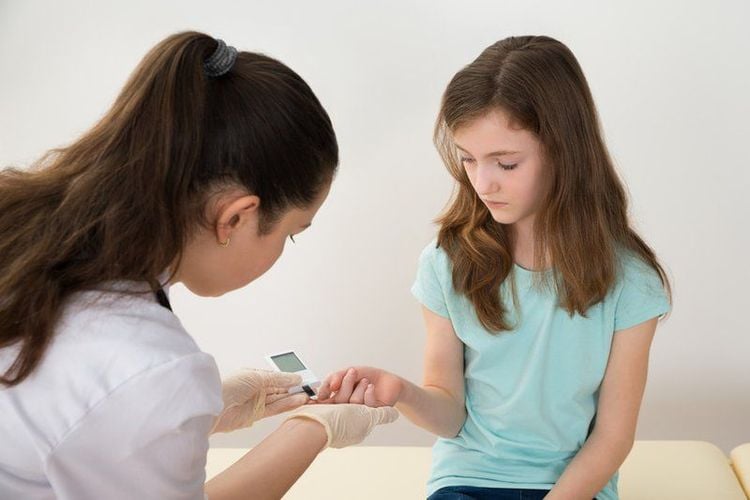This is an automatically translated article.
Unlike adults, children with type 1 diabetes are not aware of the danger of the disease, so it is difficult to control, easy to experience complications. Therefore, parents need to pay special attention to taking care of and carefully monitoring their children's blood sugar to limit the impact on their children's health, mental health and learning ability.
1. Type 1 diabetes is not an uncommon disease
Nearly 20,000 new cases of type 1 diabetes are diagnosed each year. This is a chronic condition that can lead to serious complications, especially when the disease is not well controlled. With careful monitoring and proper use of insulin, you can help children with type 1 diabetes maintain healthy lives.
2. Insulin in the treatment of type 1 diabetes
The bodies of children with type 1 diabetes do not produce enough insulin - a hormone that helps convert sugar into energy. Your body will need to take in insulin several times a day to process the sugar from the food you eat. So if you can't produce enough on your own, you need insulin injections. The doctor will consider the treatment options appropriate to the child's condition and work with the parents to create a specific plan.
3. Blood sugar level
When the body doesn't make enough insulin, blood sugar (aka blood glucose) can get too high. You need to carefully monitor your child's blood sugar until he is old enough to do this on his own. Your doctor will help your family find the right blood glucose meter for your child and guide you on how to use it.

Bác sĩ có thể hướng dẫn bạn cách kiểm tra nồng độ tiểu đường loại 1 cho trẻ
4. Blood sugar too high or too low
Blood sugar that is too high is called hyperglycemia. Symptoms include dry skin, increased thirst, and frequent need to urinate. Conversely, a blood glucose level that is too low is called hypoglycemia or insulin shock. Symptoms can include headaches, fatigue, chills, and hunger. Both of these conditions require prompt treatment.
5. Work closely with the doctor
Children with type 1 diabetes should see a doctor at least 4 times a year. If your family has trouble controlling blood sugar levels, your child may need more hospital visits. If your doctor is making some changes to your child's care plan, your family may need to visit the clinic once a week.
Some parents still do not know how severe type diabetes their child has. Experts say type 1 diabetes puts your child at higher risk of foot, eye or kidney problems. Your child will need regular eye exams and a dietitian to better understand and manage their diabetes.
6. Eat healthy
Diet is also an important part of managing your child's diabetes. You'll need to read food labels, count carbs, and learn how foods affect blood sugar. The Diabetes Association has listed some superfoods for people with this condition. Healthy, low-glucose foods include: beans, dark green leafy vegetables, some fish, nuts, fruits and berries. Add as many of these foods to your family's menu.

Trẻ mắc tiểu đường loại 1 nên bổ sung rau xanh vào chế độ ăn
7. No need to ban sweets
Children with type 1 diabetes can still eat a cookie, some cake or some ice cream from time to time, as long as you continue to monitor your child's blood sugar and adjust meals accordingly. fit.
If you want your child to eat a sweet or starchy dish, divide it into a smaller portion and cut back on some sugar-producing carbohydrates (such as potatoes, white rice) to compensate.
8. Meal time
The meal times of children with type 1 diabetes can also affect glucose levels. If the meal is later than usual, offer your child a healthy snack first to maintain good blood sugar levels. If eating earlier, monitor to make sure blood sugar levels don't get too high.
9. Physical activity
Being active is an essential part of a healthy lifestyle for all children, whether playing in the yard or on the school football team. Exercise can lower blood sugar, which is great for children with type 1 diabetes unless glucose levels get too low. It's best to check blood sugar before and after your child plays or exercises.
10. Always be prepared
If blood sugar is too high, the child will need to drink water, take insulin or exercise. Conversely, if the drop is too low, your child will need some juice, hard candy or sugar tablets.
Experts advise children with the disease to carry a kit with them, including insulin pens, contact phone numbers, rapid glucose testers and quick-acting glucose tablets... Children should also carry a notebook Get a medical checkup or a doctor's certificate with you at all times so that everyone around knows your child has type 1 diabetes.
11. Notify caregivers
Since you can't be with your child all the time, it's a good idea to let everyone know about your child's diabetes. School principals and teachers, nurses, coaches, babysitters, neighbors - all need to be informed. Ideally, they also know what to do to help the child and find a medical kit in case of an emergency.
12. Mental support
Children with type 1 diabetes must live with a chronic condition and need ongoing medical monitoring from an early age. So in addition to caring about blood sugar, you also need to pay attention to how your child is feeling. Children can sometimes feel anxious, overwhelmed, and even depressed. Many families find that a mental health professional should be with their child from the outset.

Cha mẹ có thể hỗ trợ trẻ bị tiểu đường loại 1 về mặt tinh thần
13. Growing up with diabetes
As children get older, the degree of type 1 diabetes will also change. In particular, previously effective treatments are gradually becoming ineffective. Hormones and puberty may also have an impact on the condition. Your family needs to continue to work closely with your doctor to keep your baby healthy and adjust your treatment plan if necessary. As your child gets older, your child will learn how to manage his or her own diabetes well.
14. Be a Responsible Citizen
When it comes to self-driving, your child should understand the responsibilities involved in this. Along with taking all safety precautions, children need to make sure they have a good blood sugar level before riding. Your child will need to check their glucose at all times and carry an emergency kit with them at all times.
Children with type 1 diabetes also need to know that alcohol can have a dangerous effect on blood sugar levels. The initial signs will be very difficult to recognize until the body is greatly affected, making the patient unable to adjust.
Vinmec International General Hospital is a good quality medical examination address with modern equipment and machinery and a team of highly qualified doctors. Therefore, when having health problems, patients can go to the hospital for examination and advice on a reasonable treatment regimen for each stage of the disease.
Please dial HOTLINE for more information or register for an appointment HERE. Download MyVinmec app to make appointments faster and to manage your bookings easily.













